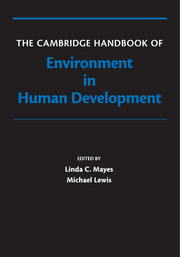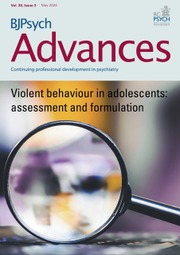The Cambridge Handbook of Environment in Human Development
£51.99
Part of Cambridge Handbooks in Psychology
- Editors:
- Linda Mayes, Yale University, Connecticut
- Michael Lewis, Robert Wood Johnson Medical School
- Date Published: July 2015
- availability: Available
- format: Paperback
- isbn: 9781107531680
£
51.99
Paperback
Other available formats:
Hardback, eBook
Looking for an inspection copy?
This title is not currently available on inspection
-
Families, communities and societies influence children's learning and development in many ways. This is the first handbook devoted to the understanding of the nature of environments in child development. Utilizing Urie Bronfenbrenner's idea of embedded environments, this volume looks at environments from the immediate environment of the family (including fathers, siblings, grandparents and day-care personnel) to the larger environment including schools, neighborhoods, geographic regions, countries and cultures. Understanding these embedded environments and the ways in which they interact is necessary to understand development.
Read more- Discusses the environments surrounding children as an essential piece of development
- Discusses the interaction of different environments and their effects on development
- The only volume to focus exclusively on environments
Reviews & endorsements
'This book will be a force for good.' John Goodier, Reference Reviews
Customer reviews
Not yet reviewed
Be the first to review
Review was not posted due to profanity
×Product details
- Date Published: July 2015
- format: Paperback
- isbn: 9781107531680
- length: 740 pages
- dimensions: 258 x 177 x 38 mm
- weight: 1.36kg
- contains: 26 b/w illus. 8 tables
- availability: Available
Table of Contents
Introduction Linda Mayes and Michael Lewis
1. Proximal to distal environments in child development: theoretical, structural, methodological, and empirical considerations Marc Bornstein
2. Risk and adversity in developmental psychology Jelena Obradovic, Anne Shaffer and Anne Masten
3. Maternal care as the central environmental variable Lynne Murray and Marc de Rosnay
4. Novel assessment techniques aimed at identifying proximal and distal environmental risk factors for children and adolescents Linda Mayes, Stacey P. Daughters and Jessica M. Richards
5. Beyond the Dyad Michael Lewis
6. Social agents and genes: comments on the ontogenesis of the 'social genome' Elena Grigorenko and Sarah Ward
7. The dynamic systems perspective: what is the system? Tom Hollenstein
8. New approaches to the notion of 'environmental risk' Jeanne Brooks-Gunn, Aliza W. Pressman and Pamela Klebanov
9. Environment across time Ronald Seifer
10. Parental care and attachment Peter Fonagy and Michelle Sleed
11. Understanding the developmental influences of the family environment Sharon Landesman Ramey and Craig T. Ramey
12. Measuring the environments of early care, education, and intervention programs for children in poverty William Gilliam and Laura Stout Sosinsky
13. School influences on human development Jacquelynne Eccles and Robert W. Roeser
14. Siblings and peers in the adult-child-child triadic context Sybil L. Hart
15. Neighborhood environments: a multi-measure, multi-level approach Ross D. Parke, Shoon Lio, Thomas J. Schofield, Louis Tuthill, Eric Vega and Scott Coltrane
16. Rural versus urban environments Robert H. Bradley
17. Current research and new dimensions Stephanie M. Jones, Monica Yudron, Aeliecia Pisciella and Hadas Eidelman
18. Social networks Mary J. Levitt
19. Marital health E. Mark Cummings and Lauren M. Papp
20. Parental psychopathology: a developmental perspective on mechanisms of transmission Nancy E. Suchman and Cindy DeCoste
21. Early exposure to trauma: domestic and community violence Alicia Lieberman and Patricia Van Horn
22. Child maltreatment: a pathogenic relational environment across development Julia Kim-Cohen, Sarah Rabbitt, Jessica Henry and Andrea L. Gold
23. The cultural organization of children's environment Sara Harkness and Charles M. Super
24. Children and electronic media Sandra L. Calvert
25. Parenting behavior as the environment where children grow Ruth Feldman
26. HOME inventory Robert H. Bradley
27. Measurement and model building in studying the influence of socioeconomic status on child development Erika Hoff, Brett Laursen and Kelly Bridges
28. Assessment of parental psychopathology and adaptive functioning Thomas Achenbach
29. Assessment of social support, social network, and social capital Brenda K. Bryant
30. Stress reactivity in child development research: indices, correlates, and future directions Jelena Obradovic and W. Thomas Boyce
31. Mixed model analyses for repeated-measures data Peter J. Molfese, Yaacov Petscher and David L. Molfese.
Sorry, this resource is locked
Please register or sign in to request access. If you are having problems accessing these resources please email [email protected]
Register Sign in» Proceed
You are now leaving the Cambridge University Press website. Your eBook purchase and download will be completed by our partner www.ebooks.com. Please see the permission section of the www.ebooks.com catalogue page for details of the print & copy limits on our eBooks.
Continue ×Are you sure you want to delete your account?
This cannot be undone.
Thank you for your feedback which will help us improve our service.
If you requested a response, we will make sure to get back to you shortly.
×









